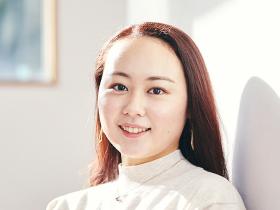A global approach to mental health care: Aiming at a future as a Certified Public Psychologist
In the fast-paced, busy world of today, it is important for everyone to watch after their mental health. Makiko Hibi, who hopes to work as a psychologist in the future, says she wants to help people in ways that only a human can, no matter how advanced technology becomes. Here she talks about what she has learned at Meiji Gakuin and her goals for the future.


Makiko hibi
Fourth-year student, Department of Psychology, Faculty of Psychology
Ms. Hibi entered the Department of Psychology with the hope of closely working with human minds in the future. She has been interested in volunteering and working overseas since her junior and senior high school days, and since entering Meiji Gakuin University she has participated in various activities, both in Japan and abroad. Examples include volunteering with “Soup Club,” participating in an SDG field study in India, a short-term study abroad program in Spain, and serving as a representative on the Meiji Gakuin Olympic–Paralympic Project Executive Committee and as a volunteer for the Tokyo 2020 Olympic Games. After graduation, she plans to go on to graduate school. Her hobbies include badminton, which she has been playing since junior high school, and playing the piano. Her favorite saying is“A joyful evening may follow a sorrowful morning.”
-
Things only people can do
When I was in high school, making vague plans for my future, I decided I wanted to do something that only humans can do well. I believe that with the recent development of various technologies, in the future robots and AI will replace humans in many fields. Of course, it’s great that advanced technology can enrich human lives, but when I thought about how I could still help people in that context, I began to think about how difficult it would be to care for people’s hearts and minds if both parties weren’t human beings. Realizing I would love to play such a role was my first step toward wanting to become a psychologist.
Another reason was my interactions with a school counselor I met in high school. Frankly, anyone can just sit and listen to others’ problems. But simply listening isn’t enough—I wanted to properly study and acquire the skills for finding solutions suited to the person in question. To acquire such knowledge and skills, I started searching for a university where I could study psychology.

Considering how to deal with trauma
As I studied psychology at college, I became increasingly interested in researching how some people can experience everyday, familiar events as traumatic. I am currently enrolled in the seminar of Dr. Hiroshi Morimoto, who specializes in cognitive-behavioral therapy, and I am studying the cognitive processes of people who have suffered trauma and what is required for them to overcome it. I would like to apply the results of research to treatment approaches for people who have suffered trauma.
Clinical psychology and psychiatry generally deal with life-threatening “lethal” trauma, but I chose “non-lethal” trauma as my research topic because I wanted to focus on more familiar events that people can experience. We tend to think of trauma as being triggered by particularly significant events, but it is in fact a problem that can arise from minor everyday mistakes or issues in human relationships that anyone can have. However, while the trauma and painful feelings arising from such trivial events can eventually lead to mental illness, they can also become a catalyst for turning your life around. So the question becomes, how can we alleviate the pain of trauma and have it lead us to the next step in our lives? I feel that academically exploring these methods and linking them to clinical approaches is something that relies on human interaction, and is something that only human beings can accomplish.

The importance of seeing and experiencing with your own eyes
We only get to study at university once, and in addition to studying psychology, I wanted to try so many other things I was interested in. I was interested in international exchange and volunteering from the start, so after starting at Meiji Gakuin I studied Spanish and French, took part in a short-term study abroad to experience different cultures myself, and I took advantage of an opportunity to learn about SDGs during a field study in India.
I also served on the Meiji Gakuin Olympic–Paralympic Project Executive Committee, which was one of the reasons why I decided to enroll here. In preparation for the 2020 Tokyo Games, we cooperated with the Olympic Organizing Committee in various ways. From my first year at college I managed many projects, including hospitality training, volunteer tourist information, events allowing participants to experience parasports, and IOC lectures, and later I became a representative of our organization. The delay due to the COVID-19 pandemic, however, along with all the other irregularities surrounding the Olympics, forced many changes and limitations on our plans, sometimes making them difficult to realize them. But most importantly, my studies of psychology and social work made me feel conflicted about the visible disparity between those who were excited about the Olympics and those who were suffering from the pandemic. The experience of working through trial and error to figure out what I could accomplish, as well as visiting Olympic venues myself and providing support to athletes and officials from all over the world, will be something I treasure for the rest of my life.
As in any situation, we need to see and experience things for ourselves. We cannot shy away from failures, setbacks, and things that don’t go our way. Rather, we need to face them, consider what we can do, and act. I believe doing so is a vital part of studying psychology and providing psychological support in a clinical setting. It would be no exaggeration to say that the many encounters and experiences I had during my college life are all connected to my learning.

Transcending borders through psychological care
After graduating, I hope to go on to graduate school and continue my research while working toward becoming a Certified Public Psychologist and a licensed clinical psychologist. I’m sure that once I’m in graduate school, my many classes and practical training courses will keep me very busy, so to be honest I have mixed feelings of anticipation and anxiety, but I am determined to move forward, sure that I will be able to develop myself as needed. I gained this determination and confidence during my university years.
In the future, I hope to provide psychological support activities in various clinical settings such as hospitals and schools. I also hope to join Doctors Without Borders to provide psychological care for people suffering from trauma overseas. Insufficient healthcare resources in conflict zones and countries with poor economic infrastructure is a major challenge that the world continues to face. Many refugees and people in conflict zones have suffered adversity and have likely been traumatized. Exactly what I’m learning now will be useful when I cross borders and travel to foreign countries, and this is one of the goals I’ve been striving toward since high school.
There are still many other things I want to do, such as working overseas and passing on my experience and knowledge as a researcher to future generations. I would like to improve my skills and deepen my knowledge by addressing issues that confront me one-by-one as I strive toward realizing each of my many goals.

